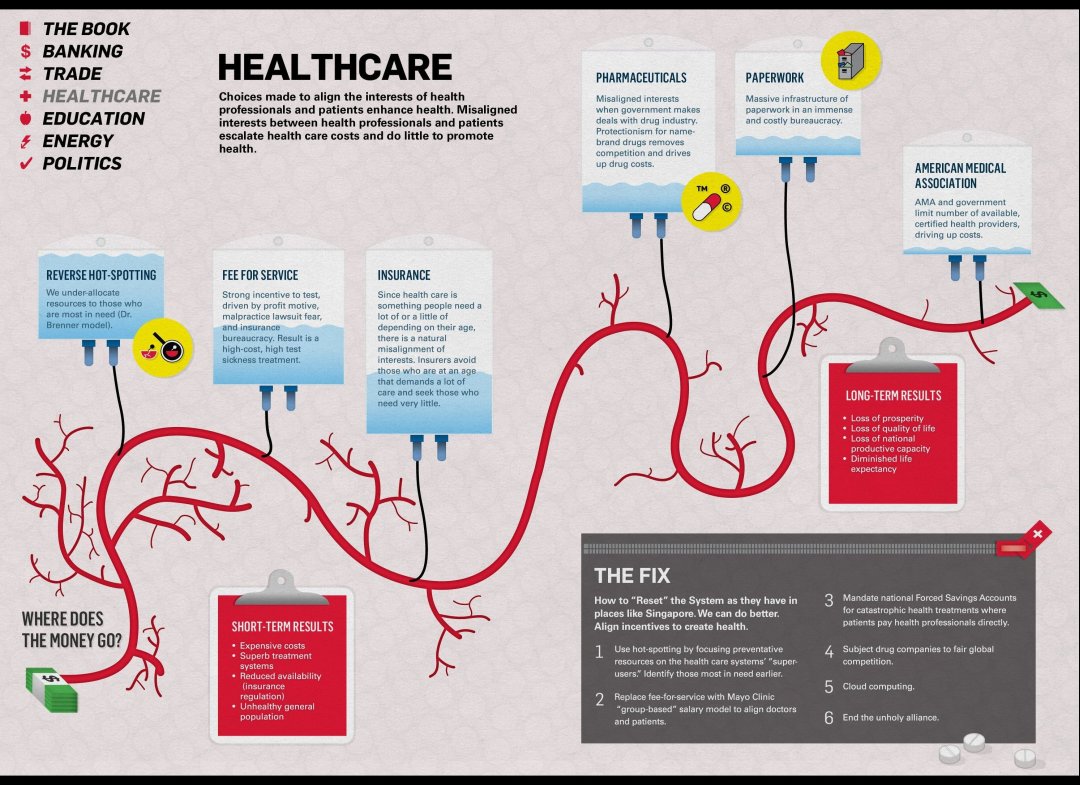
Auction 2012 is a week long series in partnership with The Huffington Post and United Republic.
The point of seeing a doctor -- or being one -- should be to improve health. After all, besides your mother or spouse, who do you count on to care about your well-being more than your doctor does? That is literally his or her job. But what I've found, and I've written about in my new book Greedy Bastards, is that the same incentives distorting banking, energy, education, and government are distorting our very bodies.
The American health care system has incentives so out of alignment for everyone involved that it's a Greedy Bastard paradise. For American health care providers, the goal isn't to get you healthy, but to get you paying. And similar to banking where the costs of a low interest loan might be a hidden balloon payment, the costs of our health care system are hidden from the end consumer.
One basic problem with the system is how doctors are paid, the fee for service model. In fee for service models, doctors are paid based on the treatments they deliver rather than the health outcomes they generate. So for instance, if you need an expensive surgery, your doctor gets paid to operate. If you don't need surgery, your doctor doesn't get paid. This creates an obvious incentive to recommend surgery, even when you don't need it. And it also discourages looking at the evidence of what works and what doesn't, because expensive but ineffective procedures create more profit for the doctors and hospitals that host and perform them.
This prioritizing of money over health outcomes shows up in the political influence the American Medical Association uses to stifle competition. Shikha Dalmia, a senior policy analyst for the nonprofit think tank Reason Foundation, described in Forbes how the AMA used its political influence to insist that only doctors could deliver babies, even though midwives have performed this service for years. "In 1995 thirty-six states restricted or outright banned midwifery, even though studies have found that it delivers equally safe care at far lower prices than standard hospital births."
Then there's the prescription drug problem, where pharmaceutical companies leverage their political influence to protect and expand drug monopolies. In one case, a company called KV Pharmaceuticals got the FDA to give it an exclusive franchise over a hormonal agent used for years by obstetricians. The price jumped from $300 a treatment to $25,000. Pharmaceutical companies advertise to convince you that you are sick, and spend $61,000 per doctor on promotional costs to get doctors to prescribe you their drugs.
This wouldn't be affordable for most of us if we had to pay the sticker price. But we don't, because most of us are covered by increasingly expensive third party health insurance (through our employers, which is yet another problem). This insurance is protected by a law granting health insurance companies the right to monopolize state coverage, a monopoly retained by the enormous sums spent by the health insurance industry in Washington ($263 million from 2009-2010 alone).
None of this improves health outcomes, or is necessary for good health. Sometimes it is counterproductive, because it discourages collaboration and the adoption of best practices. In my book, I spent time learning about the Mayo Clinic, where doctors are paid on a flat salary, and where they operate in teams. This promotes the sharing of information, and leads to far better health outcomes. I also spoke with Jeff Brenner, a specialist in Camden, New Jersey, one of the poorest areas in the country. He assembled a team to specifically target the most expensive cases, and using this technique of hotspotting, was able to save millions of dollars. For instance, he found out that one diabetic was continually relapsing because he wasn't wearing his glasses when he injected himself with insulin, and so was taking the wrong dose. This alone saved thousands of dollars in hospital bills, but in our fragmented health system, it wouldn't be anyone's job to tell you that you aren't taking your medicine correctly. In fact, the hospital would make money on every return visit.
As with banking, energy, and education, we have the skills and tools we need to improve outcomes and cut costs. We know how to stop Greedy Bastards from ruining the system and bankrupting us. They are after all operating according to certain incentives, and those incentives are malleable.

No comments:
Post a Comment